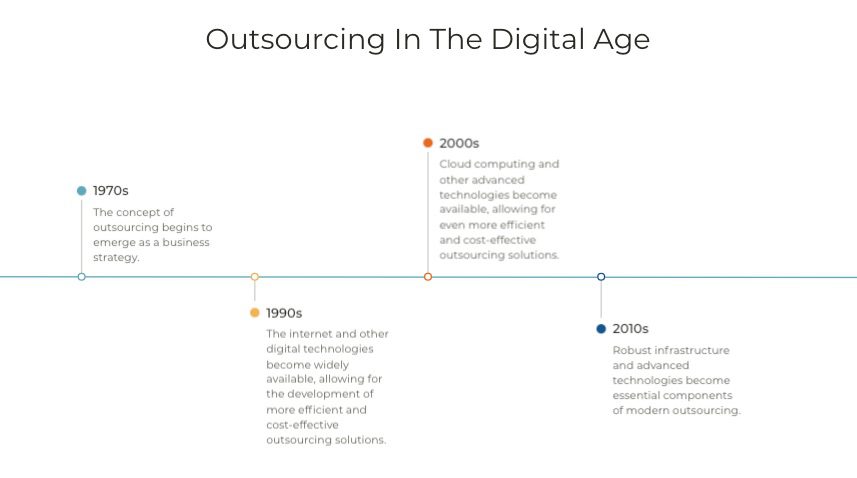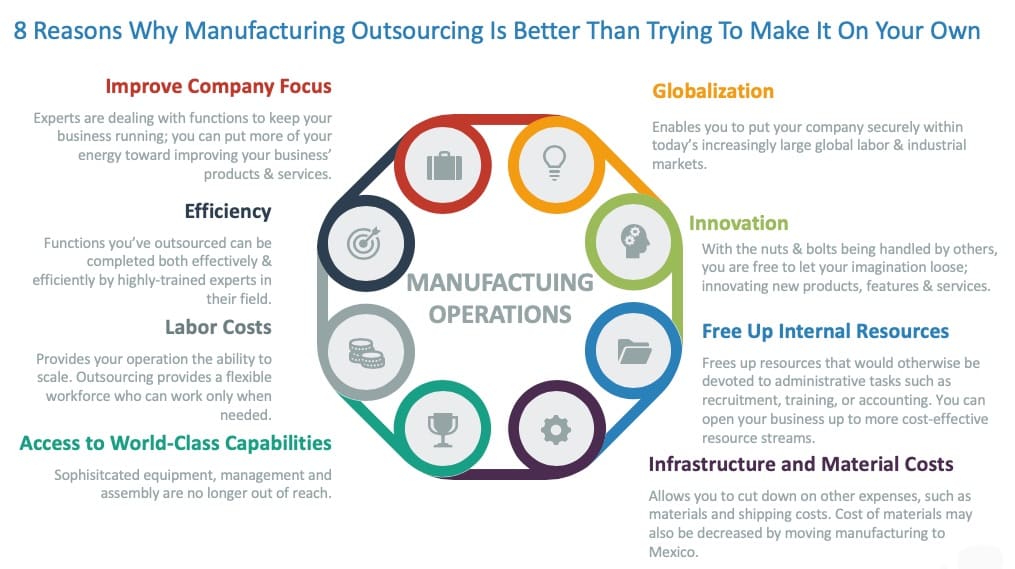Last Updated on June 9, 2024
In today's global business landscape, outsourcing services have become an integral part of many companies' operations. The decision to outsource services shouldn't be taken lightly, as it can significantly impact a company's success and growth. NovaLink understands the importance of making informed decisions when it comes to outsourcing. In this comprehensive guide, we will break down the factors that influence how a company decides where to outsource services. This will empower you to make the most informed choices for your business.
Choosing the Right Outsourcing Services: A Comprehensive Guide #outsourcing #manufacturing #mexico #novalink Share on XDefining Outsourcing
Before we delve into the decision-making process, let's clarify what outsourcing entails. Outsourcing refers to the practice of contracting specific business functions to external vendors or service providers. This strategic move allows companies to focus on their core competencies while leveraging specialized expertise and resources from external entities.
Outsourcing means more than simply sending jobs overseas. It's a way to get help for certain types of work that's in the best interest of a company.
What Is Outsourcing? How Do Companies Use It?
Evaluating Cost and Budget
The primary consideration when deciding where to outsource services is the cost-effectiveness of different locations. Companies aim to reduce operational expenses while maintaining or improving service quality. Factors such as labor costs, overhead expenses, and exchange rates play a crucial role in determining the financial viability of outsourcing to a particular location.
It's critical to conduct a comprehensive cost analysis that includes both direct and indirect outsourcing expenses. This analysis should consider factors like wages, infrastructure costs, regulatory compliance, and tax incentives offered by different countries or regions.
Knowing how to calculate total manufacturing costs is incredibly important supply chain data. If you know your inventory value, you can calculate your company’s sales margins and use that information to identify where you could trim unnecessary expenses. You can also more accurately account for your inventory on your balance sheet and the cost of goods sold on your income statement, as well as compare your total manufacturing costs to your total revenue to quickly see profitability.
Total Manufacturing Cost Formula: Metrics that Matter
Assessing Expertise and Skills
The expertise and skills available in a potential outsourcing destination are paramount to outsourcing success. When evaluating service providers, it's crucial to assess their capabilities, track record, and industry-specific knowledge. Look for partners who have a proven track record of delivering high-quality services and possess relevant expertise to meet your business requirements.
Additionally, consider the availability of a skilled workforce in the chosen location. A talented pool of professionals with the desired skill sets can contribute significantly to outsourcing success.
Analyzing Cultural Compatibility
Cultural compatibility is often overlooked but plays a significant role in outsourcing success. When considering outsourcing to a specific country or region, it's vital to evaluate the cultural alignment between your organization and the potential service providers. Factors such as language proficiency, work culture, and communication styles can impact collaboration, efficiency, and overall satisfaction with an outsourcing partnership.
When considering outsourcing to a specific country or region, it's vital to evaluate the cultural alignment between your organization and the potential service providers. #outsourcing #manufacturing #novalink Share on XAssessing Infrastructure and Technology
Modern outsourcing relies heavily on robust infrastructure and advanced technologies. When deciding where to outsource services, consider the quality and reliability of the infrastructure available in the chosen location. Access to stable power supplies, efficient telecommunications networks, and secure data centers are crucial factors to ensure uninterrupted service delivery.
Additionally, you should consider the technology capabilities of potential service providers. Are they equipped with the latest software, hardware, and cybersecurity measures? A strong technological foundation will enable efficient processes, streamlined communication, and enhanced data security.

Evaluating Legal and Regulatory Factors
Legal and regulatory frameworks vary across countries and significantly impact outsourcing decisions. Consider the legal environment and compliance requirements of potential outsourcing destinations. Factors such as intellectual property protection, data privacy regulations, and contractual laws should be thoroughly examined to ensure a secure and legally compliant outsourcing arrangement.
Mitigating Risks and Ensuring Data Security
Outsourcing involves risk, especially when it comes to data security and confidentiality. Companies must prioritize risk mitigation strategies and evaluate potential service providers' data protection commitment. Conduct due diligence on cybersecurity measures implemented by service providers, such as encryption protocols, access controls, and incident response plans.
One of the biggest risks of outsourcing data and analytics is data security and privacy. You need to ensure that your data is protected from unauthorized access, use, or disclosure, and that it complies with relevant laws and regulations. You should review the provider's data security and privacy policies and practices, and verify their certifications and accreditations. You should also use encryption, authentication, and authorization techniques, and conduct regular audits and tests.
How do you avoid common pitfalls and risks of outsourcing data and analytics functions?
Conclusion
In conclusion, the decision of where to outsource services requires a comprehensive evaluation of various factors. By considering cost-effectiveness, expertise, cultural compatibility, infrastructure, legal and regulatory aspects, and risk mitigation, you can make well-informed decisions that align with your business objectives.

NovaLink provides tailored outsourcing solutions that address your unique requirements. With our industry expertise and commitment to quality, we strive to be your trusted outsourcing partner. Contact us today to explore how our services can contribute to your company's growth and success.
Frequently Asked Questions (FAQs)
1. How do I determine the cost-effectiveness of outsourcing services?
To determine the cost-effectiveness of outsourcing services, you should consider various factors such as labor costs, overhead expenses, exchange rates, and incentives offered by different locations. Conduct a comprehensive cost analysis that includes both direct and indirect expenses associated with outsourcing. This analysis will provide insights into the financial viability of outsourcing to a specific destination.
2. What should I consider when assessing the expertise of potential service providers?
When assessing the expertise of potential service providers, consider their capabilities, track record, and industry-specific knowledge. Look for partners who have a proven track record of delivering high-quality services and possess the necessary technical expertise to meet your business requirements. It's also essential to evaluate their workforce's skills and ensure they align with your outsourcing needs.
3. How important is cultural compatibility in outsourcing decisions?
Cultural compatibility plays a crucial role in the success of outsourcing arrangements. It affects collaboration, communication, and overall satisfaction with the outsourcing partnership. Evaluate the cultural alignment between your organization and potential service providers, considering factors such as language proficiency, work culture, and communication styles. Cultural compatibility promotes better understanding and cooperation between both parties.
4. What role does technology play in outsourcing services?
Technology plays a significant role in modern outsourcing. Evaluate the technology capabilities of potential service providers, including their software, hardware, and cybersecurity measures. A strong technological foundation enables efficient processes, streamlined communication, and enhanced data security. Ensure that the service provider's technology aligns with your business requirements and supports your long-term goals.
5. How can I ensure data security when outsourcing services?
To ensure data security when outsourcing services, prioritize risk mitigation strategies. Conduct due diligence on potential service providers' cybersecurity measures, including encryption protocols, access controls, and incident response plans. Consider their commitment to data protection and confidentiality. It's also advisable to establish clear contractual agreements regarding data security and confidentiality to protect your sensitive information.
About NovaLink
As a manufacturer in Mexico, NovaLink employs a unique approach that transcends the traditional model of shelter production. More than just the location of your manufacturing, we would like to become a partner in your manufacturing in Mexico. You will be able to relocate or initiate manufacturing for your company in Mexico in a low-cost labor environment with very little delay or up-front costs. Find out how we can help you by handling the manufacturing process.
There are NovaLink facilities in the border cities of Brownsville, Texas, Matamoros, Mexico, and Saltillo, Mexico.
Explore More: Discover Related Blog Posts
Expand your knowledge and delve deeper into sourcing in Mexico with our curated collection of related blog posts.
- How Mexico Is Strengthening Supply Chains for Long-Term Stability
- Is Your Supply Chain Ready for a Mexico Move?
- How to Streamline Supply Chains in Mexico Without Losing Your Mind (or Your Margin)
- The Most Overlooked Advantage of Mexico’s Logistics Infrastructure
- Stop Wasting Time—These Are the Fastest Trade Routes in Mexico